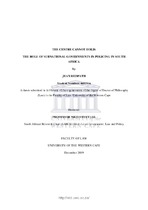| dc.description.abstract | South Africa continues to experience one of the highest crime rates in the world. Crime is unevenly distributed, and the police are not trusted by the majority of citizens. The power and responsibility for policing lies with the national government, through South Africa’s negotiated constitutional framework. Only a limited form of policing under local government, severely constrained by onerous requirements, is permitted in the legislative framework. Such centralisation of policing in federal states is theorised to be necessary to avoid partisan policing and armed separatism; to prevent local capture of police by local politicians; to ensure uniformity, equity and democratic change, and to ensure equitable outcomes; and to bring efficiencies of scale to policing. | en_US |

